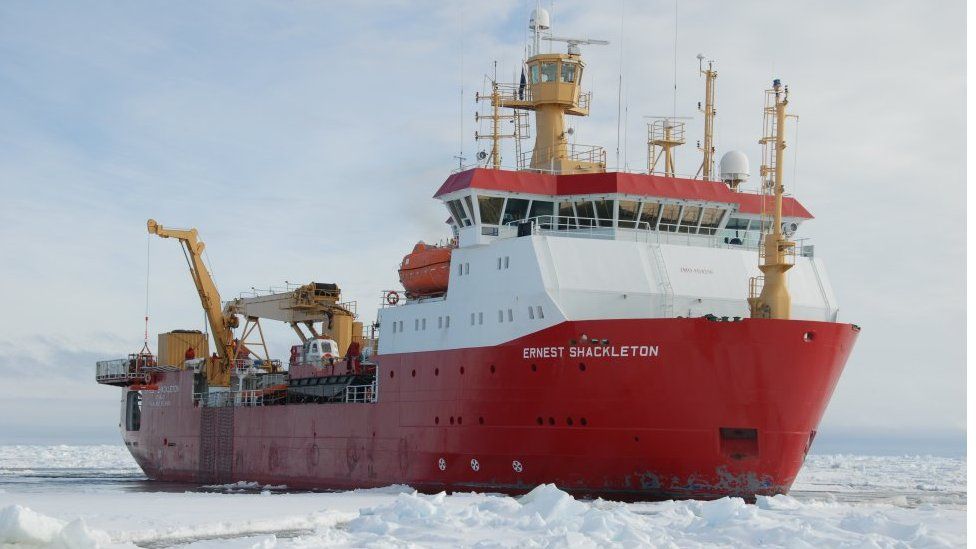UK-funded ice breaker in 'elite' Arctic tourism row
- Published
- comments

Concerns have been raised about the participation of a UK science vessel in an Arctic tourist voyage.
Funded by the UK government, the RRS Ernest Shackleton normally carries out support work for the British Antarctic Survey (BAS).
But this summer the ice breaker has been chartered to accompany a luxury liner's voyage in the Arctic.
Critics say it is inappropriate for a vessel dedicated to science to support tourism in such a fragile area.
Global warming has seen a rapid rise in the number of ships travelling through Arctic waters in recent years.
The Northwest Passage - a shortcut from Asia to Europe through the Canadian Arctic - first became fully clear of ice in the summer in 2007.
Since then only a handful of ships have travelled the route - 17 in 2015, according to the US Coast Guard.
This summer the Crystal Serenity aims to become the biggest passenger ship yet to attempt to sail through the famous route.
Starting in Alaska, the 32-day voyage will see the 1,700 passengers and crew travel 1,500km across the top of Canada, ultimately ending in New York.
Berths on the 14-deck luxury liner are not cheap, starting at around $20,000 per person and running up to $120,000 for a deluxe stateroom.
While the route is accessible to ships, it is not ice-free and the company behind the voyage has chartered an ice breaker, RRS Ernest Shackleton, from the British Antarctic Survey.
The Shackleton is normally used as a logistic support and research ship for UK scientific activities in the Antarctic.
Critics say that a vessel normally dedicated to science should not be enabling tourism in an area like the Arctic, acknowledged by many to be one of the most vulnerable areas to climate change.
"There is a significant tension between the science and environmental mission of the Shackleton and its participation in an exercise in tourism that has an enormous per capita carbon footprint," Prof Michael Byers from the University of British Columbia told BBC News.
Prof Byers, who holds a chair in global politics and international law, was invited on the trip to give a series of lectures to passengers. He refused, as he believes this summer's trip will only encourage others.
"This voyage is a significant contribution, at least on a per capita basis, to climate change by people who are going to see an ecosystem before it is destroyed by climate change. I find that irony quite terrible," he said.
In a statement, the British Antarctic Survey said it had chartered the Shackleton to Crystal Cruises, the company behind the trip, as the ship would not be deployed in the Antarctic at that time.
"Cruise ship tourism in both polar regions is well-regulated," it said.
The Crystal Cruises brochure says that as well as increasing the safety of passengers, the Shackleton will also "offer a platform from which guests will be able to disembark for landings in the wilderness, kayak in scenic coves, take guided zodiac (inflatable) cruises and view the vast Arctic wilderness from above from one of the two helicopters".
According to BAS, the charter is to "provide operational support to Crystal Serenity as well as the facility to carry additional expert guides and crew. Specialised safety equipment will be onboard. Zodiacs and helicopters are operated by Crystal".
Crystal Cruises says it is taking every precaution to ensure a minimal impact on a fragile environment.
The ship and the ice breaker will both use low-sulphur diesel, rubbish will be stored or incinerated on board, and waste water will not be discharged until the ship is at least 12 nautical miles from shore.
While environmentalists applaud these efforts they are also concerned that the presence of the RRS Ernest Shackleton is bolstering the appeal of the trip and encouraging tourism on a wider scale.
"It is a concern," said Marcie Keever from Friends of the Earth in the US.
"I'm glad they have the backup safety-wise [but] it feels a little bit like they are putting a gloss on it; they have got something reputable to escort them. It gives them more legitimacy; it doesn't feel very good," she said.
One of the features of this year's voyage will be visits to small and remote communities in the Arctic during visits to port. Prof Michael Byers says this one of the most unappealing aspects of the journey.
"They (local populations) have endemic tuberculosis, sky high rates of diabetes, with people who are living in poverty and desperation," he said.
"The people who are coming off the cruise ships are not in the 1%, but in the 0.1% of the world's financial elite. It is another example of just how extreme this particular voyage is."
Crystal Cruises say it is planning another trip through the Northwest Passage in 2017.
Follow Matt on Twitter @mattmcgrathbbc and on Facebook.